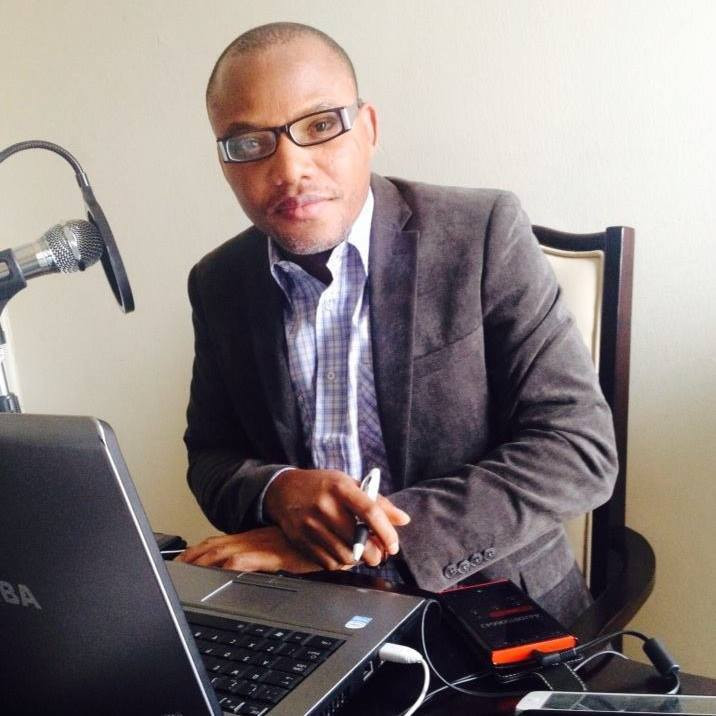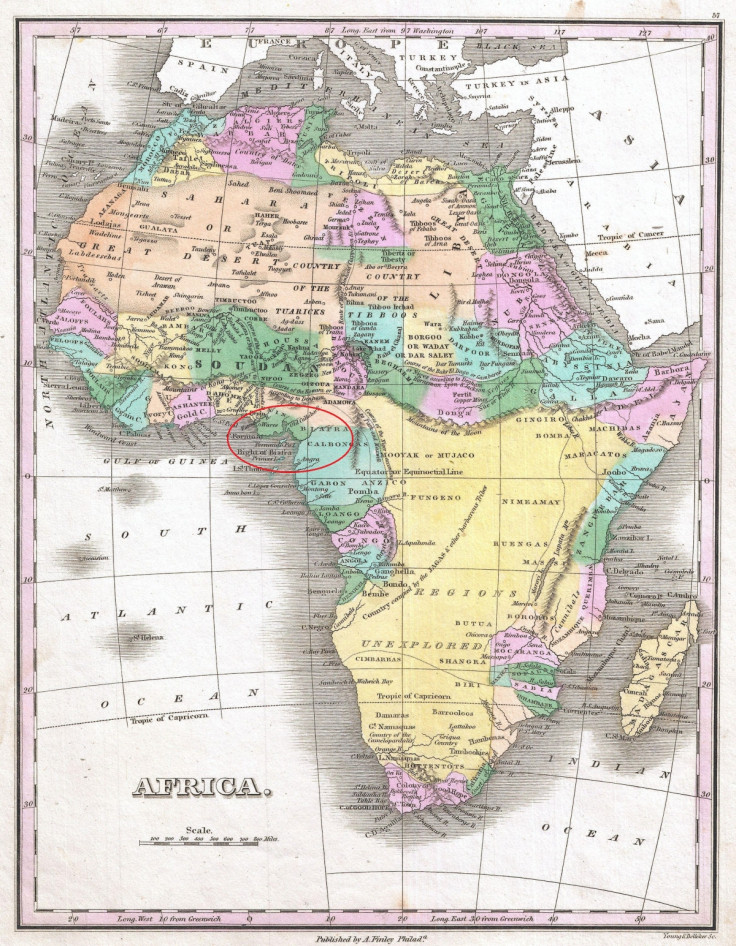Nnamdi Kanu: Ipob leader whereabouts unknown despite Nigeria security forces claiming he is on bail

The leader of a separatist movement that calls for the independence of Biafra from Nigeria has been released on bail, Nigeria's state security service (DSS) told IBTimes UK. Nnamdi Kanu was apprehended by the DSS in Lagos after he had flown from the UK, where he lives, earlier in October.
Kanu is considered the leader of Indigenous People of Biafra (Ipob) and is the director of the London-based radio station Radio Biafra, which the Nigerian government has deemed illegal. Ipob and other groups advocate for the independence of the Biafran territories, which separated from Nigeria in 1967 and were re-annexed to the African nation in 1970 following a civil war that killed between one and three million people.
When contacted by IBTimes UK on 21 October, a spokesperson for the DSS said: "Yes, [Kanu] is free, he is on bail". The spokesperson refused to give further details on the bail and on Kanu's whereabouts. The Vanguard newspaper featured an interview with Kanu's lawyer, Egechukwu Obetta, who claimed the Ipob leader had been granted bail for the sum of 2 million Naira (£6,500).
However, Ipob members and supporters of the Biafra cause claimed that Kanu had not been released, with some suggesting he is being tortured by authorities. IBTimes UK was not able to independently verify the allegations of torture. Media sources supporting the break-up from Nigeria called the bail "controversial" and claimed the DSS announced the bail only "to calm the angry people of Biafra".
@LudovicaIaccino Nigeria security are liars Nnamdi Kanu has not been granted bail#they should grant him bail unconditionally#free nnamdiKanu
— moses osuji (@moses91492577) October 21, 2015@ludovicaiaccino No!!!!! They're are still torturing and starving him to death & lie to the world. #free @nnamdikanu1 or we go to war!
— GENTLE-WISDOM (@Paul_Ihechi) October 21, 2015In the middle of the Twitter storm following Kanu's arrest, some people spoke out against him, claiming he is "a fraudster" that uses the Biafra cause for his own interests. Some also accused Radio Biafra of promoting hate speech against those who do not support the independence of Biafra or belong to ethnic groups other than Igbo, the biggest ethnic group in the Biafran territories.
In an interview with IBTimes UK, David Otto, CEO of UK-based global security provider TGS Intelligence Consultants, said Kanu might have been arrested in relation to his role in the activities of Radio Biafra, which the Nigerian government has made illegal. The government claimed in July that the National Broadcasting Commission (NBC) had managed to jam its signal.
Kanu's arrest triggered protests, mainly attended by women, in several states in Nigeria. It is believed that traffic was disrupted in Porth Harcourt, Rivers State, during protests, which also occurred in Anambra and Delta states.
LIVE UPDATE @FoxNews FREE #NNAMDIKANU pic.twitter.com/Ogugdc08I3
— Emeka Gift (@EmekaGift) October 20, 2015Some protester accused the police of shooting on the women who were calling for Kanu's release. This is not the first time that pro-Biafrans have accused authorities of being violent. The police denied the claims, while rights group Amnesty International said in an exclusive report to IBTimes UK that there is "credible evidence that pro-Biafran separatists in Nigeria are targeted by police".
In recent months, Nigerian police have been cracking down on pro-Biafrans amid allegations they are hosting violent protests and after the inspector general of police, Solomon E Arase, released a statement urging authorities to clamp down on people who behaved violently across the country.
A perceived increase in pro-Biafran activities was also confirmed by Anambra State commissioner of police Hassan Karma during another interview with IBTimes UK. He said: "It is people taking laws into their hands and it's the same situation that generated Boko Haram today in the north east. People started like this, even in Niger Delta, where militants started kidnapping people for extortion."
Otto warned that pro-Biafrans might turn into a violent movement if they join forces with Niger Delta militants. In an exclusive interview with IBTimes UK he said that there are fears that the pro-Biafran movement is "gearing up to seek for a secession".

Biafra history
After the end of the British rule in 1960, Nigeria consisted of territories that were not part of the nation before the colonisation, resulting in escalating tensions among the communities.
People in the Eastern Region - a former federal division of Nigeria with capital Enugu - mainly from the Igbo community, wanted to secede due to ethnic, religious and economic differences with other communities in Nigeria. The Eastern Region gained independence and was proclaimed Republic of Biafra following two coup d'etats in 1966 and 1967.
The fact that Nigeria's oil was located in the south of the country played a major role in the eruption of the war, during which medicine and food shortages in Biafra led to the death of thousands of people.
Biafra has been commonly divided into four main "tribes": the Igbos, the Ibibio-Efiks, the Ijaws and the Ogojas. The modern-day states that make up Biafra from the eastern region and midwest are: Anambra, Enugu, Imo, Delta, Bayelsa, Abia, Cross River, Akwa-Ibom, Rivers, Ebonyi, southern part of Ondo State, Igbanke in Edo State, southern part of Benue State.
Amalgamation contract and birth of Nigeria
Pro-Biafrans cite the expiration of a so-called "amalgamation contract" as one of the reasons to justify their will to separate from the rest of Nigeria.
The contract was issued by Britain during the colonisation era and aimed at integrating people from the north and the south within 100 years since it was issued despite cultural, religious and economic differences among the various ethnic groups.
The contract, now at the National Archive of London, was created in 1914 by Frederick John Dealtry Lugard, the governor general of modern-day Nigeria. The document, opposed by the political class and the media in Lagos, expired in 2014.
The term "Nigeria" was created by Lugard's wife, British journalist Flora Shaw, in 1897 when she suggested to replace the "British protectorate of the Niger River" with a shorter term.
© Copyright IBTimes 2024. All rights reserved.







